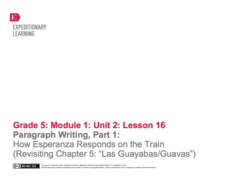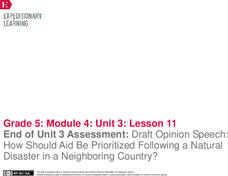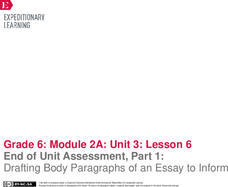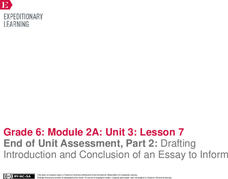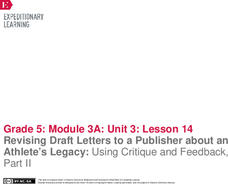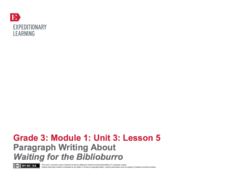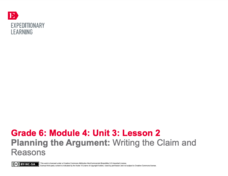EngageNY
End-Of-Unit 2 Assessment: On-Demand Analytical Essay About How Esperanza Changes Over Time
Close the unit on Esperanza Rising with an in-class analytic essay on how Esperanza changes over the course of the novel. Writers can use any of their notes and work from the unit as well as their drafts of the first two paragraphs of...
EngageNY
Paragraph Writing, Part II
Come up with a list of requirements for this expository essay on Esperanza's character in Esperanza Rising as a class and use the list to guide class writing. Here, learners will complete the first paragraph, discuss their notes for the...
EngageNY
Writing, Critique, and Revising: Two-Voice Poems (Chapter 14: "Las Ucas/Grapes")
Continue work on the two-piece poem that compares two characters from Esperanza Rising. Give class members a few minutes to finish their drafts. After they have a complete product, model how to critique and edit the poems with one group....
EngageNY
Paragraph Writing, Part 1: How Esperanza Responds on the Train (Revisiting Chapter 5: "Las Guayabas/Guavas")
When your class members have completed the novel Esperanza Rising, they will be ready to write an expository essay on how Esperanza responds to events and what this says about her character. Set your pupils up for success by starting out...
Fusco’s English Class
Journal Writing Prompts
Inspire thoughtful journal entries with these detailed journal writing prompts. The resource includes 24 prompts that require learners to write expository, persuasive, and sometimes creative journal entires.
Fluence Learning
Writing Informative Text: Did Shakespeare Write Shakespeare?
William Shakespeare penned some of the richest and most fascinating works of literature—or did he? Middle schoolers read three brief informative passages and conduct additional research to evaluate the claim that Shakespeare did not...
Fluence Learning
Writing About Informational Text: Beyond the Beyond—Galaxies
Everyone has a different point of view, even when it comes to the enormity of the universe. Two separate text passages explain the scope of a galaxy, prompting young readers to write an essay about each author's argument and how the...
Core Knowledge Foundation
Unit 6: American Revolution
The American Revolution is the theme of a five-week unit that focuses on reading, grammar, morphology, and writing. Scholars read and respond to texts, practice spelling and word work, and write paragraphs. Assessments gauge comprehension.
Curated OER
Coins In Space! (Creative Writing)
Young scholars practice creative writing. They write an imaginative story in which quarters escape from the space shuttle and ends up in the hands of an alien. Students brainstorm ideas, write a draft, revise, and edit their composition.
Classroom Jr.
George Washington Story Starter
Imagine traveling back in time and having the opportunity to meet the very first president of the United States, what would you do? Challenge the imagination and creative writing skills of young learners with this fun writing prompt.
Classroom Jr.
Running for President Story Starter
Most American children have, at one point or another, imagined what it would be like to run for president. Offer this creative writing prompt to young writers and discover how the world would change if kids were charge.
EngageNY
End of Unit 2 Assessment: Working with Two Texts - Reading, Listening, Summarizing, and Synthesizing
As a summative assessment for this unit on colonial trade, fourth graders listen to and read informational texts in order to demonstrate their ability to take notes, write summaries, and draw connections. Young scholars first listen as...
EngageNY
Mid-Unit Assessment: Completing My Draft Position Paper
What's the difference? Scholars analyze the similarities and differences between introductory and concluding paragraphs. Then, using a model essay as a guide, they write their draft position papers.
EngageNY
End of Unit Assessment, Part 1: On-Demand Essay “What Makes A Hurricane A Natural Disaster?”
It's time to refine writing and word choice. Learners work on Part 1 of their end of unit assessment by creating an essay titled What Makes a Hurricane a Natural Disaster? They use glossaries and graphic organizers from previous lessons...
EngageNY
End of Unit 3 Assessment: Draft Opinion Speech: How Should Aid Be Prioritized Following a Natural Disaster in a Neighboring Country?
Put it to the test. With the cumulative resource, pupils complete the End of Unit 3 Assessment. Using everything they've learned in the unit, they write a draft of an opinion speech about how to prioritize aid after a natural disaster.
EngageNY
Mid-Unit 3 Assessment, Part I: Short Constructed Response and Organizing Notes for a Public Speech
It's time to put pen to paper. Scholars complete the first part of the mid-unit 3 assessment, writing a short constructed response about international aid following a natural disaster. Next, pupils use informational texts and note...
EngageNY
End of Unit Assessment, Part 1: Drafting Body Paragraphs of an Essay to Inform
Anybody can write a body paragraph! Pupils analyze the development of ideas in a body paragraph from a model essay. Next, using what they've learned, they draft the body paragraphs of their My Rule to Live By informative essay.
EngageNY
End of Unit Assessment, Part 2: Drafting Introduction and Conclusion of an Essay to Inform
A powerful introduction and conclusion can really pack a punch. Using the resource, scholars first read and discuss a model essay. Then, as part of the end of unit assessment, they draft the introductory and concluding paragraphs of...
EngageNY
Revising Draft Letters to a Publisher about an Athlete’s Legacy: Using Critique and Feedback, Part II
Let's get opinionated. Scholars participate in a peer critique and revision process using a fun activity called a Four Corners strategy. After incorporating classmates' feedback, individuals share their final drafts of their opinion...
EngageNY
Revising Draft Letters to a Publisher about an Athlete’s Legacy: Critique and Feedback, Part I
Pick a corner, any corner! Pupils use the Four Corners strategy and Peer Critique protocol to assess one another's draft letters to a publisher about an athlete's legacy. Scholars then use peer feedback to revise their letters.
EngageNY
Paragraph Writing About Waiting for the Biblioburro
Ask your learners to synthesize what they know about Waiting for the Biblioburro by writing a well-organized paragraph. Young writers focus on using transition words and including specific details in their paragraphs. The plan allows for...
EngageNY
Planning the Argument: Writing the Claim and Reasons
Step up! Using the resource, scholars discover the six steps to writing an effective position paper. Next, they work on a graphic organizer to begin planning their argument-based essays.
Curated OER
Tell It to the Judge - Persuasive Essay
Learners write a persuasive essay that compares and contrasts a classic fairy tales with a fractured one. They use the writing process to complete and publish the essay.
Dream of a Nation
Writing a Narrative Essay
Imagine using narrative essays to encourage change. This multi-week unit plan does just that. After reading a series of articles from Tyson Miller's Dream of a Nation: Inspiring Ideas for a Better America, class members examine the...





